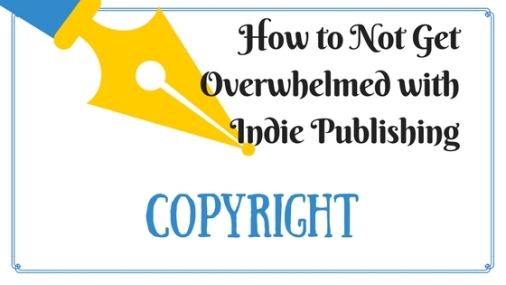
This is the fifth article in the series: How to Not Get Overwhelmed with Indie Publishing. Below is the list, including links to the subjects we’ve already covered. Today’s topic is Copyright. We’ll be focusing on US, though, because that’s where I live. It will be purely informational since copyright involves law, and I do not give legal advice.
- Acquiring Beta Readers
- Editing/Editor Considerations
- Book Cover Design
- The Back Cover Synopsis & Author Bio
- Copyright (US)
- Paper & Ebook Publishing Platforms (mainly US)
- ISBN (and bar code (US))
- Ebook Formatting
- Paperback and Hardbound Formatting
- Uploading Your Book to One or Various Platforms
- Marketing Strategies
Here’s the symbol
Here are the codes for various uses of the copyright symbol:

Here’s the definition of Copyright from Merriam-Webster:
“the exclusive legal right to reproduce, publish, sell, or distribute the matter and form of something (as a literary, musical, or artistic work)”
US Copyright office: http://www.copyright.gov/
FAQ page:
http://www.copyright.gov/help/faq/index.html
Copyright Basics:
http://www.copyright.gov/circs/circ01.pdf
The biggest questions I had when I first started my search were “when is my work officially copyright protected?” and “do I have to register to be protected?“
The FAQ answers both questions and then some. Your original work is copyrighted the moment you write it and you have the protection of copyright, but if in the US you need to go to court over infringement then you’ll want to consider the relatively low cost of registering, as outlined at the Basics link above and excerpted here:
Copyright Registration
In general, copyright registration is a legal formality intended to make a public record of the basic facts of a particular copyright. However, registration is not a condition of copyright protection. Even though registration is not a requirement for protection, the copyright law provides several inducements or advantages to encourage copyright owners to make registration. Among these advantages are the following:
- Registration establishes a public record of the copyright claim.
- Before an infringement suit may be filed in court, registration is necessary for works of U.S. origin.
- If made before or within five years of publication, registration will establish prima facie evidence in court of the validity of the copyright and of the facts stated in the certificate.
- If registration is made within three months after publication of the work or prior to an infringement of the work, statutory damages and attorney’s fees will be available to the copyright owner in court actions. Otherwise, only an award of actual damages and profits is available to the copyright owner.
- Registration allows the owner of the copyright to record the registration with the U.S. Customs Service for protection against the importation of infringing copies. For additional information, go to the U.S. Customs and Border Protection website at www.cbp.gov/.
Registration may be made at any time within the life of the copyright. Unlike the law before 1978, when a work has been registered in unpublished form, it is not necessary to make another registration when the work becomes published, although the copyright owner may register the published edition, if desired.
Copyright fact sheets of particular interest:
- Books/Manuscripts/Speeches: http://www.copyright.gov/fls/fl109.pdf
- International: http://www.copyright.gov/fls/fl100.pdf
- Pseudonym: http://www.copyright.gov/fls/fl101.pdf
Here’s the basic legalese of what copyright protects:
Copyright protection subsists, in accordance with this title, in original works of authorship fixed in any tangible medium of expression, now known or later developed, from which they can be perceived, reproduced, or otherwise communicated, either directly or with the aid of a machine or device. Works of authorship include the following categories:
- (1) literary works;
- (2) musical works, including any accompanying words;
- (3) dramatic works, including any accompanying music;
- (4) pantomimes and choreographic works;
- (5) pictorial, graphic, and sculptural works;
- (6) motion pictures and other audiovisual works;
- (7) sound recordings; and
- (8) architectural works.
(b) In no case does copyright protection for an original work of authorship extend to any idea, procedure, process, system, method of operation, concept, principle, or discovery, regardless of the form in which it is described, explained, illustrated, or embodied in such work.
The short of it: a) If it’s your original, written down work it’s copyrighted; b) the stuff that might have inspired your writing isn’t covered; c) you can register at any time, but if not done within three months of publication you lose certain coverage/reimbursements for infringements, and if not registered by the five-year mark it loses its strongest legal credibility: prima facie (admissibility in court that needs no other fact checking unless rebutted); e) you cannot take a claim of infringement to court until your original work has been registered (here’s a link on Quora with a good explanation for this last one).
If you’re interested you can follow US Copyright Office on Twitter!
It doesn’t hurt to have your unpublished and published works registered with the US Copyright Office. Remuneration for damages is much more likely when you have the official records to back up your claims.
I hope this information has been helpful. Depending on what country you live in you have different copyright laws. Be sure to check out your local government agency website to gain a better understanding of copyright law! Next week we’ll look at publishing platforms.

Please leave a comment, question, or idea! I’d love to chat!